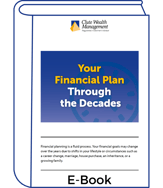
Surprise, your 60s have arrived! If you’re someone who hasn’t paid much attention to your financial future before, the 60s are the years to buckle down and get serious. If you have carefully planned your finances throughout your working life, then your 60s is the time to take a second look. Retirement is just around the corner for most people, so whatever your financial habits have been in the past, this is the decade that will determine what the next third of your life will look like.
Your life is rich and full, so squeezing in time to look at what may still seem far into the future can be a challenge. Here are six steps that will help prepare you without making you feel like money has become the only focus of your life.
1. Take a financial snapshot
Statistically, you know you may live another 20 to 40 years, but by this point you’re probably aware that not everybody lives out those years the same way. Take the time now to determine how you would like to spend your retirement years and then consider “worst-case” scenarios and the potential impact on your plans. Ask yourself the following questions:
- Do your current savings/investments strategies match your retirement goals?
- Are you living within your means or are you already dipping into accounts to supplement your income?
- Monitor your current cash flow. How much comes in and where does it go?
- What is your net worth/balance sheet? (Total assets minus liabilities)
- Are loved ones protected in the event of an early death?
2. Social Security and Medicare planning
This is a subject worthy of a future column of its own, but for now, remember that you have a number of options for drawing Social Security (many that you may not even be aware of) and that you should speak with your financial advisor and local Social Security office before making a decision. Keep in mind that for every year you defer drawing benefits past your “full-retirement age” until age 70, your benefit increases by 8%. As for Medicare, you’ll want to apply during the seven month time-frame around your 65th birthday in order to avoid any penalties (there are special circumstances if you’re still working). Your financial advisor may provide you with information on this as well.
3. Evaluate post-retirement insurance needs and your pension options
With your children grown and college tuition and mortgage obligations winding down, it’s time to re-evaluate your insurance needs. After retirement, your priorities might change from maintaining significant life and disability insurance to placing more importance on medical and long-term care insurance.
Before you retire, study your pension options carefully because your election is irrevocable. Are you more comfortable with the reduced payout of the popular joint-life survivor option, or would you rather max out your retirement income stream by selecting the life-only option and structuring a separate future income stream for your spouse?
4. Review your estate plan
During your 60s is the time to review and/or update your legal documents (Will, Power of Attorney, Health Care Proxy, etc.) to be sure they reflect your current situation and preferences. Check with your financial advisor or attorney for useful tools (such as a Personal Record Organizer) that can help you consolidate important documents/records/information in one place. You may also want to have a family meeting to give your family members a good sense of what your plans and wishes are.
5. Have a dress rehearsal
A retirement “dress rehearsal” can be an eye opener. Using a projected retirement cash flow, try to live off your anticipated retirement income for a minimum of six months. Do you need to make major changes, will some tweaking do the trick, or are you right on with your projections for income and spending?
6. Dream
With solid, practical retirement essentials planned for, you can now start to dream a little – and decide if any changes in course are warranted. Perhaps you realized that you need to increase your current savings to provide the extra funds needed for extensive travel in retirement. Or maybe you can’t see yourself “retiring” and that you’re ready to start a new career, and you’ll need to take some courses to get you ramped up.
Whatever the plan for the next third of your life looks like, these six steps for financial planning in your 60s will go a long way towards helping you make it a reality.
Your Financial Plan Through the Decades E-Book
Resources
Balance Sheet in Basic Boot Camp Financial Toolkit, Clute Wealth Management
Why a Family Meeting on Finances is a Good Idea, Clute Wealth Management
-------------
Heidi Clute, CFP® is co-owner of Clute Wealth Management in South Burlington, VT and Plattsburgh, NY, an independent firm and registered investment advisor that provides strategic financial and investment planning for individuals and small businesses in the Champlain Valley region of New York and Vermont. Clute Wealth Management and LPL are separate entities. The opinions voiced in this material are for general information only and not intended to provide specific advice or recommendations. Clute Wealth Management and LPL financial do not offer tax or legal advice or services. This information is not intended to be a substitute for specific individualized tax or legal advice. We suggest that you discuss your specific situation with a qualified tax or legal advisor.
Securities offered through LPL Financial. Member FINRA/SIPC.



